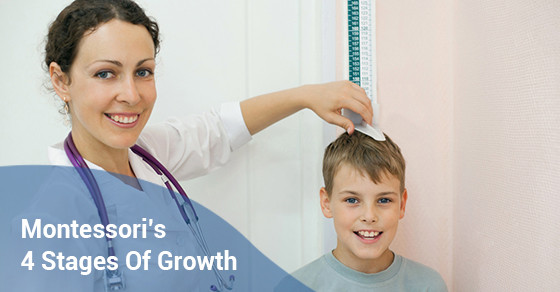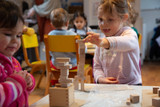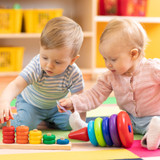All About Montessori's 4 Stages Of Growth
Maria Montessori outlined four stages of growth, also called the four planes of development. The four stages begin at birth and extend to adulthood; together they make up a holistic look at the process of development and include social, cognitive, moral, and biological changes.
Each stage lasts for six years, but Montessori also acknowledged that each stage was not meant to be rigid; these are not necessarily linear stages but more like a tide ebbing and flowing. Each stage brings a new set of needs and behaviours. There also sub-categories in each stage of growth. The Montessori products also reflect each stage.
- Infancy/Early Childhood (Birth to Age 6)
In the first substage, the child is an “unconscious creator.” Here, the baby is not conscious of learning, but is creating who he or she will become. Around age 3, the child becomes the “conscious worker,” because the child is now able to interact with the world deliberately.
- Childhood (Age 6-12)
This stage of growth is calm and stable. While intellectual growth takes place during this stage, it is not as intense as during the first stage. There are both physical and physiological changes taking place during the second stage of growth as well.
- Adolescence (Age 12-18)
Physical changes become a lot more intense during this stage. Psychologically, the teenager is unstable; he or she becomes very sensitive to criticism. Children develop “social consciousness” during this stage, where the teenager becomes more concerned about their societal role in life.
- Early Adulthood (Age 18-24)
Physical growth is not yet complete; the same holds true for psychological development. This is the stage of development where the adult begins to think about his or her contribution to humanity.
It is during this substage that the child begins to learn self-mastery and self-control.They have a great need to make their own choices at this stage. During this stage, children have an “absorbent mind”; they absorb information like sponges.
Children move from the “absorbent mind” stage to the “reasoning mind” stage. Children want to learn more about the reasons behind things. In the previous stage they wanted to know the “what,” but now they want to know the “why.” During this stage, children also begin to think about their role in the grander scheme of life, which Montessori called “the cosmic plan.”
Interestingly enough, Montessori remarked that teenagers actually regress during this stage and are less likely to do what is expected of them. This phase is also marked by a teen’s desire for independence.
Thinkamajigs offers high-quality, value-priced Montessori teaching materials, educational toys, games, puzzles, and other Montessori products, all of which you can view in our catalogue here. We ship our Montessori products anywhere in North America. Contact us for more information.
LATEST BLOG POSTS
How To Set Up A Montessori Environment At Home
Creating a Montessori-inspired environment at home provides the opportunity to support your child's...
Montessori & Technology: do they play well together?
Dr. Maria Montessori’s method of teaching children emphasizes the use of concrete materials and hand...
Froebel Gifts: An Introduction
You may have heard of Fröebel Gifts (we carry the full selection here), but you may also wonder what...
Safe Toys for Toddlers: What Parents Should Know
As a parent, you want to be sure that any toys your toddler plays with are safe and age-appropriate....
Infant & Toddler Toy Guide - Part 2
THINKAMAJIGS’ GUIDE TO CHOOSING EDUCATIONAL TOYS FROM BIRTH TO AGE 3PART 2: AGE-RELATED DEVELOPMENTA...
Infant & Toddler Toy Guide - Part 1
THINKAMAJIGS’ GUIDE TO CHOOSING EDUCATIONAL TOYS FROM BIRTH TO AGE 3PART 1: SKILLS DEVELOPMENT“What...







